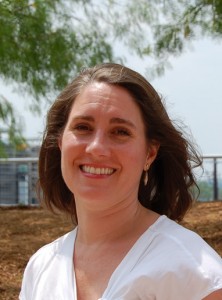René Vacchio Albee shows the benefits of studying abroad through ACC
While some professors may work at two ACC campuses, René Vacchio Albee teaches in two different countries, and she wouldn’t have it any other way.
“It’s a wonderfully rewarding experience to teach abroad,” says Vacchio Albee, an adjunct professor of Spanish. “It’s at the core of who I am as an instructor.”
In late May, Vacchio Albee will lead a group of 12 Spanish II students to Córdoba, Argentina, for five weeks of learning – with full immersion in South American life and culture.
“I think language is very obviously suited to teaching abroad. Meeting for three hours a day in a classroom plus living, breathing, eating, surviving in the foreign language – there’s just nothing like it.”
The curriculum of each study abroad course is tailored to the culture and history of the destination country, and that’s one major key to the success of ACC’s International Programs, Vacchio Albee explains.
When the topic you’re teaching is totally relevant to your environment, it’s incredible to see what happens to your students.
“ACC’s programs are set up so the experience is culturally and academically related to the course of study, like Shakespeare in Britain or ceramics in Costa Rica. It’s hard to put in words, but it makes a big difference. It’s like plants: You can water your plants all day long, but it’s not the same as the rain. Why isn’t it the same? Because it isn’t. It just isn’t.
“When the topic you’re teaching is totally relevant to your environment, it’s incredible to see what happens to your students. Even though we’re in a classroom in Argentina, just like we are here, that classroom is relevant to their experience. It’s an Argentine classroom. It’s different, down to the light switches and doorknobs.”
Access to another world
Although some countries may cause culture shock for professors and students, Vacchio Albee calls Argentina a great place for novice explorers.
“Argentina is a lot like Texas. They’re into horses and beef, their gauchos are like our cowboys, and they have a fierce sense of independence from the rest of South America. Many planning to study abroad haven’t even been outside the state of Texas. Argentina is an excellent place to first go outside our country.”
In fact, Vacchio Albee’s first experience teaching abroad with ACC was to Argentina in 2009. But International Programs gives students options around the globe, with affordable tuition and scholarship opportunities, all directly from ACC – something not many other community colleges offer.
“It’s fabulous. ACC makes studying abroad accessible academically and financially for a much greater percentage of the population than a traditional university, while maintaining credibility over programs not linked to a college.”
Diverse surroundings enrich the experience
The diversity of ACC’s programs goes beyond the variety of international locales.
“My students run the gamut – people like me, old and traveled, to people brand new, young, never been out of the Dallas-Houston-Austin triangle. Where else would I have a class of already degreed adults in their fifties alongside twenty-something first-time in college students? I don’t think you’ll get that level of diversity in a classroom stateside, let alone abroad, if you’re not at a community college.”
Like some other study abroad programs at ACC, Vacchio Albee and her students stay with local families. She says homestays give students and instructors additional opportunity to appreciate and experience a country’s culture. Students come away with a new way of looking at the world – and instructors gain a new way of looking at their profession.
“Learning a language takes a long time and lots of practice. Understanding that became even more concrete to me after going to Argentina. I saw how hard students have to work. Abroad, they aren’t studying for a test or a grade. They’re studying to get the language right and to use it every day. This taught me a different way to observe and evaluate classroom outcomes.”
Advice for faculty
Vacchio Albee offers advice to faculty interested in leading a study abroad course.
“Whether your students are seasoned travelers or green ones, they’re drawn to you because you represent ACC, the U.S., English language, and known culture. They’re going to reach for you, and you need to be there. You don’t have to solve their problems, be their therapist or their parent, but it does mean you have to comfortably and professionally transcend the standard professor-student relationship we have stateside.”
International instructors can count on plenty of support from the college.
“The International Programs department is great at anticipating and asking about your needs as a professor and providing for them. A lot goes into a study abroad program, and they do a great job of putting it all together.”
The result is gratifying for students and professors.
“Though I stay connected to many of my students beyond their time in my classroom, I am absolutely better connected with my study abroad students, and I’ve seen them grow in leaps and bounds in Argentina. I love what I do and I love doing it abroad.”
International Programs is currently accepting proposals from ACC faculty for 2012-14 study abroad programs. For more information and a proposal form, visit austincc.edu/intstudy/facstaff. Proposals are due July 25, 2011.
Students interested in studying abroad can find more information on the ACC International Programs webpage, austincc.edu/intstudy.
Back to Top



By Gustavo Cepparo May 19, 2011 - 2:11 pm
Thank you for your dedication.
You and Cordoba will change the lives of ACC students.
!Viva RENE! !Vamos ARGENTINA!
Eat many alfajores for me.
Gustavo
By Margot Rochon May 24, 2011 - 1:09 pm
Wish I was there!!! I hope everyone is having a fantastic and fruitful trip abroad :o)
By victor vigorito May 31, 2011 - 10:53 pm
Felicitaciones! Ensene a tus estudiantes a cantar el espanol como gauchos orgullosos…
By Maradona June 3, 2011 - 2:43 am
Argentinians have a strong accent talking Spanish, including slam words. In conclusion, Argentina is not a good place for learning a neutral accent in Spanish. I recomend to visit Colombia or Uruguay.
As example of strong accent in Argentina:
– decime che, queres una comision?
– y que queres que te diga?
– anda, piba, decimelo!!
– decime vos.
By Marco Hanson June 6, 2011 - 9:16 pm
Hey, good for you, René! I’ve got to try that some time. Hope to hear some stories when you get back.
By Jane Thorne July 5, 2011 - 1:27 pm
With Rene’s guidance, both sides of the border are bonanzas for those interested in the Spanish language and its nuances.
By Bruce Ronkette July 10, 2011 - 9:27 pm
Bruce Ronkette
That’s my girl.
You go Rene’
Proud PaPa
By Cheryl Nuwash July 16, 2011 - 7:53 pm
Sounds great! Congratulations! We’ve hosted a few English teachers from Argentina and I was quite impressed with their English.